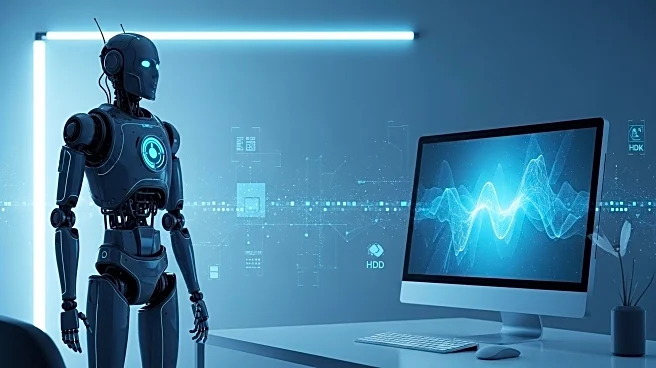What's Happening?
A recent survey conducted by Indeed has revealed that a significant portion of Gen Z tech workers are feeling threatened by the rise of artificial intelligence (AI) in the workplace. The survey, which included over 1,000 tech workers, found that 35% are concerned about AI potentially taking over their roles, with this concern rising to 38% among Gen Z workers. The report highlights that many top employers are investing heavily in AI technology, which is leading to the restructuring and redefinition of roles within companies. According to Alex Beene, a financial literacy instructor, these investments could lead to job eliminations, causing anxiety among employees, particularly those in Gen Z who are newer to the workforce.
Why It's Important?
The integration of AI into various industries is reshaping the job market, particularly affecting white-collar and creative roles. This shift is reminiscent of past changes in manufacturing due to automation and outsourcing. Gen Z workers, who are entering the workforce during this transition, face unique challenges as traditional career paths are altered or eliminated. The potential for AI to replace entry-level positions that serve as stepping stones to higher roles is a significant concern. This situation demands that Gen Z adapt quickly, acquire new skills, and reconsider traditional notions of job security, potentially leading to a shift towards trades, entrepreneurship, or specialized technical work.
What's Next?
As AI continues to evolve, companies may prioritize efficiency and shareholder returns, further integrating AI into their operations. This could lead to a reevaluation of job security and career paths for Gen Z workers. The need for upskilling and adapting to new technologies will become increasingly important. There may be a growing trend of Gen Z pursuing non-traditional career paths that AI cannot easily replicate, such as trades or entrepreneurship. The long-term impact of AI on the workforce remains uncertain, but it is clear that Gen Z will need to navigate these changes proactively.
Beyond the Headlines
The ethical implications of AI's impact on employment are significant. As AI technology advances, it raises questions about the balance between technological progress and job preservation. The potential for AI to eliminate jobs that provide foundational skills for career advancement poses challenges for workforce development. Additionally, the cultural shift towards valuing adaptability and continuous learning may redefine career success for future generations.








